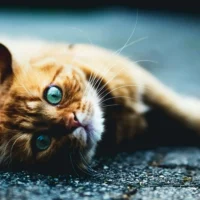Cats reach senior status around the age of eleven. Our feline companions often age gracefully, so you’re more likely to notice slight, gradual changes in your pet’s appearance and behavior rather than sudden, drastic ones. Older kitties, like elderly people, require more frequent doctor visits than their younger counterparts. As your cat enters their golden years, you might find it interesting to reflect on their journey. For a fun look at what your feline friend might have experienced over the past year, check out our article on Fluffy’s Year In Review. In this article from your animal clinic, a local Hobe Sound, FL veterinarian provides some useful advice on taking an older kitty to the doctor.
How Do I Transport an Older Kitty?
When traveling, we always recommend keeping Fluffy safely restrained in crates or carriers—it’s safer for both you and her. We recommend using a hardshell carrier to keep your pet from being bumped or jostled while you transport her in and out of the house, car, or clinic. Add soft bedding to the carrier to make it more appealing. You can also include a favorite toy or give your feline friend some catnip.
Older cats can often be quite stiff and sore, particularly if they suffer from arthritis or other medical conditions. Fluffy may feel uncomfortable just being held! Be extremely cautious when handling your furry friend. When you hold her, make sure her weight is well-supported. Then, when it’s time to put her down, do so slowly and do not let go until her paws are on the floor.
What Should I Expect As My Cat Ages?
As previously said, cats reach their senior years at roughly the age of 11. Nowadays, kitties often live well into their teens or even twenties. An 11-year-old cat may still be energetic and playful, with years of purring and pouncing ahead of her.
Once your pet reaches the age of roughly 15, she will be designated geriatric. Your furry friend may experience medical problems. Keep in mind that our feline buddies do all not mature in the same way. Some cats may appear to be absolutely content, before rapidly declining. Others may very slowly succumb to illness or disease, or just old age.
Your veterinarian, of course, should be the final authority on this. However, you should also pay close attention to your cat and look for signals that something is wrong. These may be subtle! Contact us immediately if you spot anything unusual.
What Are the Signs That Your Senior Cat Is Sick?
Weight loss, increased urination, stiffness, vomiting, diarrhea, increased thirst, litterbox troubles, and respiratory problems are some of the symptoms to look out for. You should also keep an eye out for behavioral changes. When cats aren’t feeling well, they may meow loudly or become quite silent. Fluffy may also act more or less affectionate than usual.
Lethargy can be another warning sign. Then again, it’s sort of a life goal for kitties. Fluffy may snooze for up to 20 hours a day!
Your furry friend may also appear unkempt. This is often a red flag in younger cats, but it’s not uncommon in older ones. Senior cats can struggle to groom their entire body. Plus, their fur tends to get a bit greasy. Watch for sudden changes. Ask your vet for more information on this.
How Often Should My Senior Cat Visit The Hobe Sound, FL Animal Clinic?
There is no uniform answer to this question; it will really just depend on Fluffy’s age, health, and lifestyle. We often recommend bringing in elderly cats at least once a year. However, your companion will require more frequent appointments if she has medical conditions. Geriatric cats often need to come in twice a year as well. Follow your Hobe Sound, FL veterinarian’s recommendations.
What Are Some Common Health Issues in Senior Cats?
Kitties in their golden years are vulnerable to many of the same health issues that older people face. Kidney illness is very prevalent and is one of the leading causes of death in cats. Diabetes, hyperthyroidism, cancer, heart disease, liver disease, osteoarthritis, and IBD (Inflammatory Bowel Disease) are also common conditions we see in our senior patients. Another common concern is Feline Lower Urinary Tract Disease (FLUTD), which can result in urinary blockage, bladder stones, and kidney issues.
We also frequently notice cognitive deterioration in aged felines, though this can also happen in cats that are otherwise healthy.
It’s worth noting that, while any cat can have any of these illnesses, particular breeds are more likely to develop certain problems. If you know what kind of cat your pet is, do some breed research. If not, you could consider getting a cat DNA test.
How Can I Make Appointments Easier For My Elderly Cat?
Since Fluffy is a homebody at heart, she won’t be happy about having her nap schedule interrupted. She also usually dislikes automobile rides in general. Cats get extremely fearful when they are removed from their kingdoms.
There are a few basic things that can be done to make the journey easier for Fluffy. In addition to providing a comfortable carrier, as previously said, you may wish to try to plan your appointment for a time when the clinic is not typically busy. There is no assurance that any day will be quiet, because emergencies can occur at any time, but some times and days are typically busier than others.
Of course, in an emergency, the goal should be to get your cat in as soon as possible.
Should You Take an Aging Cat to the Veterinarian?
It can be frightening to take an elderly cat to the doctor and not know what you’ll learn about your beloved pet’s health. Just bear in mind that your primary goal should be to keep Fluffy comfortable and happy for as long as possible.
If you notice signs that something is awry, postponing that visit may only make things worse for both you and your cat. Also, keep in mind that medicine can treat or manage a variety of medical conditions. The sooner a problem is diagnosed and treated, the better!
What Happens During A Senior Cat Veterinary Visit?
If you’re bringing your pet in for an urgent care visit, the answer will vary depending on the situation. If Fluffy is only coming in for an exam and wellness care, the appointment will most likely be pretty routine. Your veterinarian will assess your furball’s physical condition and check vital signs, such as her pulse and breathing. They will also inform you of any suggested immunizations or boosts Fluffy may require.
A senior kitty may also require some tests or panels, depending on her age and any symptoms she exhibits. Our Veterinary Diagnostics services play a crucial role in these check-ups, helping us detect and monitor age-related health issues early. These may include blood tests, urinalysis, or imaging studies to ensure your senior cat’s health is thoroughly evaluated.
How Can I Keep a Senior Cat Comfortable?
There are a few things that you can do at home to ensure that your adorable pet is content, healthy, and purring. Providing nutritious food, a comfortable environment, and a clean litterbox will go a long way. You can also make tiny changes to make your home more senior-friendly. Get some pet ramps or steps to help your feline friend reach her favorite perches, and put out night lights to help her navigate after dark. Playing with Fluffy on a regular basis can help her stay active, while also providing excellent mental stimulation. Ask your veterinarian for purrticular guidance on your cute pet’s changing care needs.
Finally, make sure Fluffy feels loved and safe. Senior cat purrs are precious!
Do you want to know more about taking care of an older cat? Do you need to book an appointment for your feline companion? Please contact us, your Hobe Sound, FL animal clinic, at any time.




